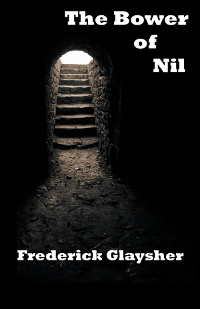The Bower of Nil: A Narrative Poem
Softcover. $18.00. Earthrise Press, 2002; 2024 Revised Edition. 72 pages. ISBN: 9780967042143. Printed in the USA, UK, Australia, India.
 BUY on Ingram Book Company's Shop Lightning Source
BUY on Ingram Book Company's Shop Lightning Source

Or USA: Bookshop.org - UK: UK.Bookshop.org, Kobo (ebooks), Order Books
 Peter Marsh, an academic philosopher struggling with analytical philosophy, weighs modern life in a conversation with his friend, David Emerson, a businessman. Brought together after long separation by the brutal murder of Mary, Peter’s wife, a time of devastating loss and crisis, their friendship inspires a dark night of the soul, during which Peter’s meditations range over several hundred years of philosophy, politics, religion, social change, the dilemmas of existence, evoking a vision of the complexities of the 21st Century, the United Nations, and global governance.
Peter Marsh, an academic philosopher struggling with analytical philosophy, weighs modern life in a conversation with his friend, David Emerson, a businessman. Brought together after long separation by the brutal murder of Mary, Peter’s wife, a time of devastating loss and crisis, their friendship inspires a dark night of the soul, during which Peter’s meditations range over several hundred years of philosophy, politics, religion, social change, the dilemmas of existence, evoking a vision of the complexities of the 21st Century, the United Nations, and global governance.
Structured around classical Greek choral movements, the first section ponders themes from Japanese Buddhism, while the second and third survey Western philosophy from Aristotle and Plato through Descartes, Pascal, Kierkegaard, Nietzsche, Wittgenstein, Heidegger, Derrida, and others, in a powerfully dramatic grappling with philosophy, East and West.
Reviews
"Glaysher explores the liberating potential of loss and acceptance as agents for empowerment." —The Carolina Quarterly
"This is a doorway into the future . . . the subtleties and complexities of the aforementioned cultures inform his subject matter and his political interests circumscribe the work. The Bower of Nil is an Orwell meets Nietzsche meets C.S. Lewis mélange of despair, madness, and hope. Not lyrical, not tidy and not information-byte-sized, your fingers come away heavy with paint—rather than print— after reading this. Colored richly and satisfyingly with symbols (e.g., the name Peter, the lily, the lantern) that speak directly to the psyche—the way that artwork spoke to the illiterate in the Middle Ages...." —Poems Niederngasse
"Glaysher pays his readers the compliment of assuming that they will have at least a basic familiarity with the major world classics and philosophies of both East and West." —Manifold 44
"The Bower of Nil is where we all live. . . . The narrator and academic, Peter, would appear to hate academics, but the 65 page poem is a masterfully executed academic exercise, using the history of western philosophical thought as a metaphorical tool. The invading enchantress -- Peter’s wife for 30 years -- has been ’stripped of her shoes and socks, spine-sliced / at the back of her neck’ and left ’on top of a garbage heap.’ Glaysher may have meant the enchantress to be more muse-like, but anarchist, hedonist Mary Marsh, as an idea, appears ever his foil. Peter’s children have had ’every advantage / of the modern world,’’ but grew up with many human failings. The narrator says one needs to learn ’to be content and to dominate oneself, / not others.’ . . . A thought provoking read for these times!" —Pulsar
"Mr. Glaysher writes with a genuine passion, with an obvious thrill at the play of ideas, and with an often compelling sense of purpose. ...very worthwhile reading and the middle section is just outstanding." —BrothersJudd.com
"In some ways, this seems like the least fashionable book imaginable in today’s poetry world, which I would hazard to say is exactly what Glaysher wants it to be." —Sidereality
The Bower of Nil
(Excerpt from Section I of III)
I
Palpable darkness pervades the room,
surrounding, infusing, permeating
every nook and cranny of the study.
Through the windows no light shines, no trace
of lingering twilight or approaching dawn.
Only suffocating pitch-black ebony hours,
hours past midnight,
hours long before predawn half-light.
Partially drawn, the curtains
shroud the windows; half-recognized,
the couch in between overflows with books,
papers, manuscripts thrown aside in haste,
disgust, ennui, acedia, despair.
Randomly piled stacks of books obstruct
the floor; papers collect dust and mites;
along two walls row on row of books
slouch haphazardly or are crammed onto
shelves designed to hold half as many.
No order but disarray cloaked in darkness.
As chaotic as the rest of the room,
the desk holds heaps of material,
half-digested, then set aside,
piled willy-nilly around and on
the computer, paperclips, scissors,
tape, discarded envelopes bearing
half an address, a half-used ream of paper,
paraphernalia of a mind searching for form,
struggling to arrest chaos itself.
On a stand next to the couch a lexicon
lies closed, repository of a language
that once signified, referred, meant something
beyond the infinite play of facile wit,
the seductive flow of consciousness
streaming from one diversion to another,
distracting itself with one curio,
momentarily, before bounding back
to the ocean of flux, sensation,
instinct, where all that sails on that sea
stands level with every other ship,
lost, seeking no port of call, no shore,
no destination but the dark horizon
of one floundering at sea.
On the brown carpet of moderate pile,
flat on his back, gazing up into the dark room,
stretched out like a corpse, lay Peter Marsh.
For three days since the murder of his wife,
he had slept very little and had spent
each night alone on the rack of the floor
of his study. More than thirty years of marriage
kept going over and over in his mind,
now replaced with scraps of conversation
from earlier that evening with David Emerson.
Continues . . .
Copyright (c) 2002 Frederick Glaysher


